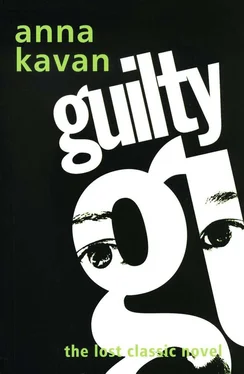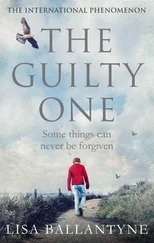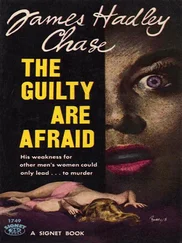It is possible that around six decades or more have passed since Anna Kavan wrote Guilty . Each of those decades has produced unimagined change: social, political, literary and technological advances challenging existing thinking and creating new paradigms. It is so remarkable, then, that this previously unpublished work from Kavan’s pen maintains a freshness and immediacy that resonates in the twenty-first century. In the course of transferring ownership of her unpublished work, an anonymous reader inserted an observation between the pages of Guilty , indicating an estimated temporal context. The handwritten note, signed ‘M.W.’ and dated 1989, reads ‘this novel is set in the First World War and is related by a youth whose father is a pacifist’.
Kavan was no stranger to war, surviving the First World War as a teenager and losing her only son, Bryan Ferguson, in 1944 to the carnage of the Second World War. She spent twenty-two months, in 1941–2, living in New Zealand with an expatriate English pacifist and conscientious objector, Ian Hamilton. With him she shared the social disapproval and condemnation experienced by those who chose to take such a stance, enduring the receipt of poison-pen letters, always anonymously authored, the whispers of locals and the wholesale dismissal of ‘shirkers’ by conscripted men and women. It was only when Hamilton’s incarceration became an inevitability that Kavan reluctantly, and with considerable difficulty, secured a return passage to England, undertaking an astonishing journey through the enemy-submarine-infested waters of the Pacific and Atlantic oceans, the sole woman aboard a small, battered, wool-carrying cargo ship. It would not be an exaggeration to propose that few other women, of any nationality, would have made the same 12,000-mile voyage during such dangerous times. The ten-week passage provided Kavan with ample time to reflect on the nature of conscientious objection and its impact on her own life. Provocatively, Hamilton’s young son, Duncan, was sent to boarding-school during the period of his father’s resistance to compulsory conscription. An autobiographical historicity was established, providing a compelling argument that facts preceded fiction.
Before her time in New Zealand Kavan had spent three months in 1940–41 in in New York, assimilated into that city’s tight circle of exiled writers, poets, musicians and artists who had fled Hitler’s Third Reich and who were referred to as ‘Communazis’ by FBI boss J. Edgar Hoover. Counting Lion Feuchtwanger among her friends, Kavan was a ready sympathizer with the dispossessed and the ‘outlandish’, sharing their justified sense of persecution and apprehension. It is therefore tempting to correct M.W.’s estimation and date the setting, if not writing, of Guilty to somewhere in the mid-1940s, a possibility that would acknowledge her experiences as a personal and powerful means of informing the narrative. Indeed, the opening sentence of the book tells us that the protagonist’s father ‘served with distinction in two wars and emerged from the army a minor hero’, information that implies participation in the two world wars.
Kavan returned to England on 28 January 1943 after three and a half years away. The culture shock of immediate and unavoidable immersion into London’s wartime difficulties profoundly affected her, prompting depression and an urgent wish to return to the relative tranquillity and comfort of New Zealand. Within days of her arrival, she initiated the paperwork required to secure an exit permit and a passage on any vessel bound for the South Pacific. For the duration of the war she continued a regular and, at times, desperately worded correspondence with Ian Hamilton, reinforcing in every letter her regret at having left New Zealand. Her letters illustrate the effect of the impersonal ‘machinery’ of bureaucracy on the mentality of the individual, whose sole intent might be to house or feed oneself. The following excerpts exemplify the personal experiences which may well have informed the writing of this book.
February 14 1943, c/- Barclay’s Bank, Piccadilly Circus, W1 [written while Kavan stayed in a hotel in London]
To find a flat seems quite impossible & I’m still in this place that’s full of worldly gilt & decayed past magnificence & American officers with blondes … Dolphin Square and all the other big blocks of flats have mile-long waiting lists. The only alternative is some dingy, grim, grey, Bayswater bedsittingroom. I suppose I’ll come to it in time.
February 25 1943, c/- Barclay’s Bank, Piccadilly Circus, W1 I can’t get a flat anywhere, & it’s utterly hopeless to find any place at less than 6 guineas, and that’s hard enough. Next week I’m taking a large room in Hampstead which is the best I can do. It’s probably a mistake, like all my moves, but I have to go somewhere cheaper & that’s all I can find.
March 7 1943, 15 Cannon Place NW3
I wish I cd describe these vast government institutions to you: the passes, forms, official documents of all kinds; the miles of corridors; the innumerable officials to be interviewed [by] in their different bureaux; the extra-ordinarily complicated & apparently irrelevant procedures. It’s pure Kafka, of course. At times when I am in one or another of these enormous buildings waiting for an interview with some new authority, I feel as if I were the victim of a private madness induced by too much reading of the ‘The Trial’ and ‘The Castle’.
October 12 1943, Crossways Cottage, Well Rd NW3
I sent a cable to you to tell you that the Authorities had actually granted my permit to leave the country. But of course that doesn’t mean that I’ll get away soon. All shipping arrangements here are made through a central board & one is simply notified that there’s a passage about 24 hours before the ship’s due to sail. NZ House informs me that there won’t be any accommodation for some months; almost certainly not this year … the Authorities may decide to cancel the permit in their capricious & unpredictable way.
Guilty is an anomaly. Deceptively, it resembles in tone and style Kavan’s early work, written under her married name, Helen Ferguson, and famously described by her friend Rhys Davies as ‘Home Counties novels’. Her occasional use of clichés and the chronological linearity of this story, completely absent in her later work, contradict the Kafkaesque sinister content, leaving the reader unprepared for the disconcerting developments that unfold. It is Eagle’s Nest (published by Peter Owen in 1957) which the Kavan enthusiast associates most with the work of Franz Kafka. In 1983 Robert Hauptman observed that ‘it is in Eagle’s Nest that the full influence of Kafka and modernism are palpable for the first time’ in Kavan’s writing ( A Critical Survey of Long Fiction , edited by Frank Northen Magill, Salem Press, Pasadena, 1983). Impressed by the ‘insistence upon dream, fantasy, and escape into unreality, the quest, the narrative structure, and the ambiguity’, he concludes that Eagle’s Nest ‘is one of Kavan’s outstanding books, particularly as it is flawless’. I suggest that Guilty is more unnerving, more disorienting, and therefore more Kafkaesque, because it adheres more closely to perceived reality, to the ordinariness of a single unspectacular life. No castles, no ruins, no mountainous terrain. The topiary chessmen at Mark’s school, ominous in the dark, are, after all, simply trees.
The horror evolves in the simple task of finding somewhere to live in an increasingly unfamiliar world. If the reader of Kavan’s impressive list of publications should be called upon to identify an especially ‘Kavanesque’ feature of her post-1940 writing, he or she would undoubtedly point to the disturbing motif of unreality and to her portrayal of the precariousness of the liminal mindscape between sanity and insanity. The human condition is universal, but few dare to write of it with such acuity. Kavan was a heroin addict and, like her antecedents Thomas de Quincey and Jean Cocteau, she allowed her drug use to take her imagination into scenes denied the non-drug user. Her most successful novel, Ice (1967), was chosen by Brian Aldiss as his Science Fiction Book of the Year, an indication of the outer limits Kavan visited in her imagined and imaginary discourse.
Читать дальше












